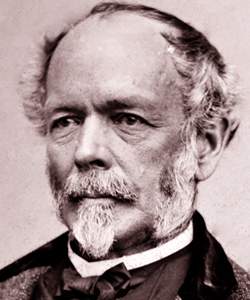Joseph Eggleston Johnston (American National Biography)
Scholarship
Johnston's defense of North Georgia in the spring and summer of 1864 is the most controversial aspect of his career. Because Johnston was heavily outnumbered by the three armies of Major General William Tecumseh Sherman (who had 100,000 men to Johnston's 60,000), Sherman was able to maneuver him out of position after position: from Rocky Face Ridge in North Georgia, to Resaca, to Allatoona, and to Kennesaw Mountain west of Marietta. Each time, Sherman was able to hold Johnston's army in position with superior forces and send a flanking column to threaten the Confederate left. Each time, Johnston responded by abandoning his position and hurrying southward to interpose his forces once again in front of Sherman--but of course he had to surrender territory to do so. Engagements were fought at Resaca (13-15 May), New Hope Church (26-28 May), and Kennesaw Mountain (27 June). Though Johnston held his own in each, he was unable to inflict the kind of defeat that would drive Sherman from Georgia.
In Richmond, Davis grew increasingly concerned that Johnston was giving up so much territory. As a result of his retrograde movements, the Yankees had occupied Rome, Georgia, an important industrial town, and Johnston seemed unwilling to launch a serious counterattack. By the second week of July, Davis sent Braxton Bragg to Atlanta to inquire about Johnston's future plans. Unsatisfied with Johnston's response, Davis ordered him relieved and appointed John Bell Hood to command the army (17 July 1864).
In Richmond, Davis grew increasingly concerned that Johnston was giving up so much territory. As a result of his retrograde movements, the Yankees had occupied Rome, Georgia, an important industrial town, and Johnston seemed unwilling to launch a serious counterattack. By the second week of July, Davis sent Braxton Bragg to Atlanta to inquire about Johnston's future plans. Unsatisfied with Johnston's response, Davis ordered him relieved and appointed John Bell Hood to command the army (17 July 1864).
Craig L. Symonds, "Johnston, Joseph Eggleston," American National Biography Online, February 2000, http://www.anb.org/articles/04/04-01176.html.
Joseph Eggleston Johnston (Congressional Biographical Directory)
Reference
JOHNSTON, Joseph Eggleston, (brother of Charles Clement Johnston and uncle of John Warfield Johnston), a Representative from Virginia; born in Longwood, Prince Edward County, Va., February 3, 1807; moved with his parents to Panicello, near Abingdon, Va., in 1811; attended the Abingdon Academy; was graduated from the United States Military Academy, West Point, N.Y., in 1829; pursued a career in the Army and was promoted through the ranks to brigadier general and quartermaster general; resigned April 22, 1861, to enter the Confederate service; during the Civil War was appointed major general of the Virginia State forces on April 26, 1861; commissioned brigadier general, Confederate States Army, May 14, 1861, and general on August 31, 1861, in which capacity he served until April 26, 1865, when the terms of surrender of his army were agreed upon; settled in Savannah, Ga.; was president of a railroad company in Arkansas; and engaged in the general insurance business in 1868 and 1869; returned to Virginia and settled in Richmond in 1877 and became president of an express company; elected as a Democrat to the Forty-sixth Congress (March 4, 1879-March 3, 1881); was not a candidate for renomination in 1880; was appointed Commissioner of Railroads by President Grover Cleveland in 1887 and served until 1891; died in Washington, D.C., March 21, 1891; interment in Greenmount Cemetery, Baltimore, Md.
“Johnston, Joseph Eggleston,” Biographical Directory of the United States Congress, 1774 to Present, http://bioguide.congress.gov/scripts/biodisplay.pl?index=J000192.



